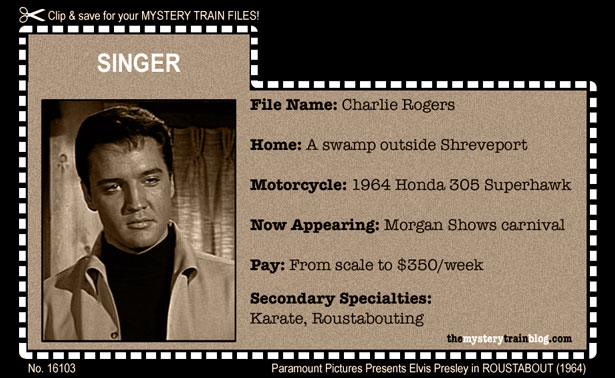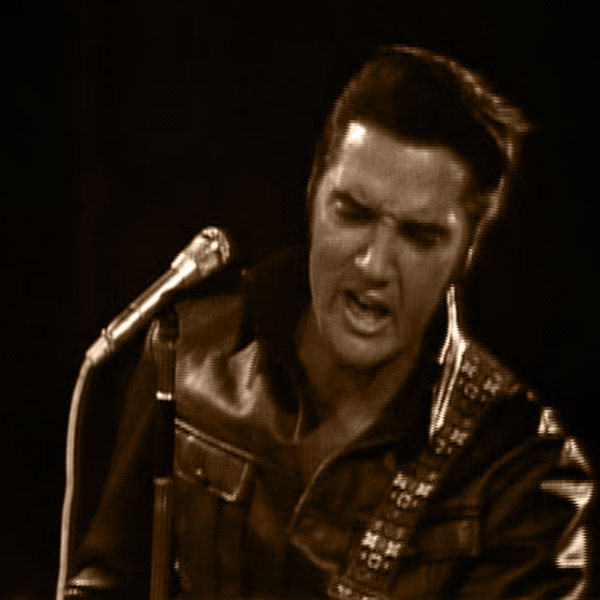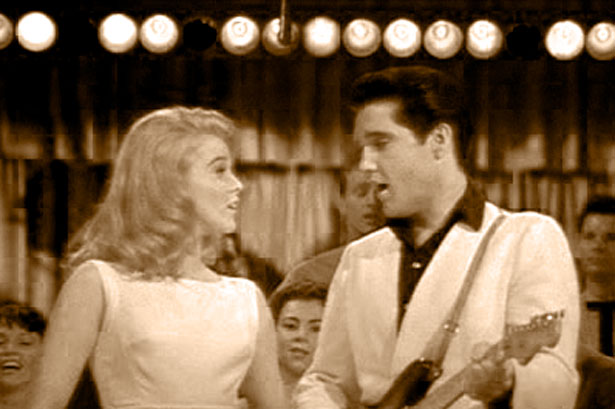Earlier this year, I began a rewatch of Elvis Presley’s movies. Today’s focus is one that I have not seen as often as some of the others – Elvis’ 16th movie, Roustabout.
“Elvis Presley as a Roving, Restless, Reckless, Roustabout”

Roustabout (Paramount)
Wide Release: November 11, 1964 (United States)
Starring: Elvis Presley, Barbara Stanwyck, Joan Freeman
Screenplay By: Anthony Lawrence and Allan Weiss
Story By: Allan Weiss
Music Score By: Joseph J. Lilley
Produced By: Hal B. Wallis
Directed By: John Rich
Running Time: 101 Minutes

Elvis Presley is Charlie Rogers in 1964’s ROUSTABOUT (Paramount)
In Roustabout, Elvis Presley stars as Charlie Rogers, a singer who ends up working at a carnival when Joe (Leif Erickson), a grouchy old carny, runs him off the road, damaging his motorcycle and destroying his guitar. Ah, Elvis Movies, you gotta love ’em.
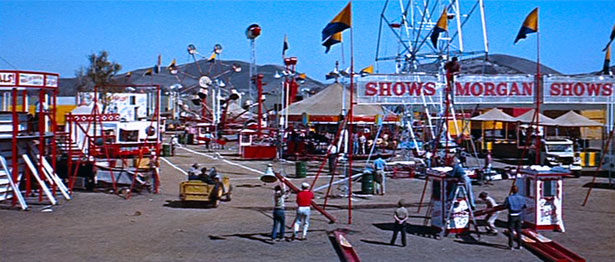
The Morgan Shows carnival in 1964’s ROUSTABOUT (Paramount)
Despite the inane setup, Roustabout is pretty good! When Maggie (Barbara Stanwyck), the owner of the carnival, pays for a new guitar and repairs to his motorcycle, Charlie stays on as a roustabout until his bike is ready in order to spend more time with Cathy (Joan Freeman), Joe’s daughter. Joe, of course, is not amused by this turn of events.

Joan Freeman is Cathy and Elvis Presley is Charlie in 1964’s ROUSTABOUT (Paramount)
Outside of this movie, “roustabout” is not a term I have encountered. It essentially means an unskilled laborer. It seems to be used most often today in the oil rigging industry. In this case, Charlie does odd jobs at the carnival, such as helping to set up rides or even filling in at a candy apple stand.
When attempting to attract players for a game that Cathy is promoting, Charlie winds up singing and drawing a crowd. His roustabout days are soon behind him, for Maggie signs him on as a singer instead.

Charlie Rogers (Elvis Presley) begins to draw a crowd for Morgan Shows when the carnival signs him on as a singer in 1964’s ROUSTABOUT (Paramount)
It turns out that Maggie has a habit of bailing Joe out of trouble, and her carnival is facing financial ruin because of it. Charlie brings in the teen money, and the situation begins to improve until things come to a head between him and Joe, causing Charlie to switch to a rival carnival.

Barbara Stanwyck is Maggie Morgan in 1964’s ROUSTABOUT (Paramount)
Elvis does a fine job acting in certain parts of Roustabout. A scene between him and Barbara Stanwyck is my favorite of the film:
Charlie: “You collect strays, Maggie. And you got one in Joe. Why don’t you stop recruiting? They don’t make a family.”
Maggie: “What would you know about a family?”
Charlie: “Nothing!”
After Maggie walks away and can no longer hear him, Charlie repeats the line again, softly, sadly: “Nothing…” It is a quick moment, but certainly one of Elvis’ best in his 1960s movies.

Elvis Presley is Charlie Rogers in 1964’s ROUSTABOUT (Paramount)
The rebellious Charlie is reminiscent of some of Elvis’ earliest film roles. For instance, Charlie remarks early on, “Look, if you’re not tough in this world, you get squashed, honey.” These words could have been taken right out of Vince Everett’s mouth in Jailhouse Rock (1957). Charlie also has traces of Deke Rivers from Loving You (1957) and even a little bit of Danny Fisher from King Creole (1958). At 29 during production of Roustabout, however, Elvis does seem a little old at times to be playing a rebel.
Even some of Elvis’ mannerisms in Roustabout remind me of his 1950s presence, otherwise left out of many of his 1960s movies. Elvis’ performance of “One Track Heart” in Roustabout, for instance, is quite reminiscent of his 1956 “Blue Suede Shoes” screen test, except with a less exciting song. Later on, during “Hard Knocks,” he does his more typical 1960s movie hand-clapping thing, though.
Elvis’ natural flair for comedy comes into play a few times in Roustabout. One example:
Cathy: “You must get your face slapped a lot.”
Charlie: “About 50–50.”
Pat Buttram does a terrific job playing the villainous Harry, the owner of the big-time carnival that is looking to put Maggie out of business. Another great couple of lines:
Charlie: “Not everybody is as big a crook as you are, Harry.”
Harry: “Well, everybody tries.”

Pat Buttram is Harry and Elvis Presley is Charlie in 1964’s ROUSTABOUT (Paramount)
Charlie’s show goes over well, and Harry asks him to do an encore. “Nah,” says Charlie. “Always leave ’em wanting more.” This phrase, of course, was the philosophy of a real-life carny huckster, “Colonel” Tom Parker, when it came to managing Elvis. Parker also served as technical advisor on Roustabout and most of Elvis’ other films.
I try not to review soundtrack albums in this series, focusing any discussion of songs instead on how they appear in the movies themselves. However, I do want to point out in this case that Roustabout has one of the worst soundtrack albums – with nary a hit or highlight in sight. I was surprised, then, that just about all of the songs work perfectly in the context of the actual film. Perhaps based on the fun of seeing the movie, fans propelled the otherwise lackluster Roustabout soundtrack to Billboard‘s number one album position in January 1965. It would be over eight years before Elvis scored another number one album (1973’s Aloha From Hawaii via Satellite).
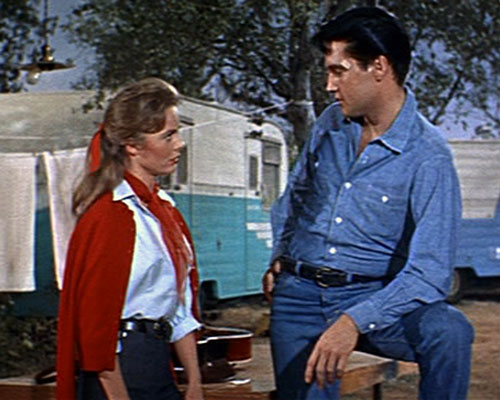
Joan Freeman is Cathy and Elvis Presley is Charlie in 1964’s ROUSTABOUT (Paramount)

Elvis Presley in a production number taped for 1968’s ELVIS television special (NBC)
Roustabout obviously had an influence on some of the production numbers created for the 1968 ELVIS television special, even down to costuming. The denim outfit that Elvis wears at times in the movie is almost identical to one he wears during portions of the special, for instance. Roustabout is also one of the few times we see Elvis in leather prior to the special. The barker lines on the ELVIS-TV Special soundtrack album might even have been directly lifted from recordings made for this movie. The performance of “Little Egypt” in the ’68 special is better than the cringey one in Roustabout, incidentally, though the outdated song is a detriment to both productions anyway.

Charlie Rogers (Elvis Presley) at Harry’s carnival in 1964’s ROUSTABOUT (Paramount)
Boldly Go
Multiple uncredited cast members from Roustabout went on to play roles in Star Trek.
K.L. Smith plays the Sheriff in Roustabout and appears as a Klingon in the Star Trek episode “Elaan Of Troyius” in 1968.

Elvis Presley is Charlie and K.L. Smith is the Sheriff in 1964’s ROUSTABOUT (Paramount)

K.L. Smith is a Klingon captain in the 1968 STAR TREK episode “Elaan Of Troyius” (Paramount)
Other cross-overs include:
- Dick Cherney [Roustabout: Carnival patron | Star Trek: A council member in “A Taste Of Armageddon” (1967) and a passerby in “The City On The Edge Of Forever” (1967)]
- Carey Foster [Roustabout: College girl | Star Trek: An Enterprise crewmember in “The Squire Of Gothos” (1967), “This Side Of Paradise” (1967), and “The Alternative Factor” (1967)]
- Teri Garr [Roustabout: Carnival dancer | Star Trek: Roberta Lincoln in “Assignment: Earth” (1968)]
- Marianna Hill [Roustabout: Viola | Star Trek: Helen Noel in “Dagger Of The Mind” (1966)]
- Jesse Wayne [Roustabout: Carnival worker | Star Trek: Chekov stunt double in “The Tholian Web” (1968)]
Some of these players will show up again in other Elvis movies not yet covered, giving them another chance to be featured here on The Mystery Train Elvis Blog.
An honorable mention goes to Elvis’ pal Lance LeGault, who appears as a barker in Roustabout and plays Captain K’Temoc in the Star Trek: The Next Generation episode “The Emissary” in 1989.
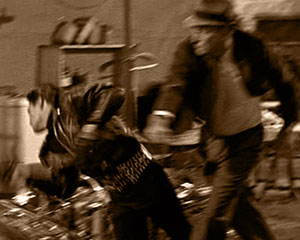
Elvis Presley takes a pummeling as Charlie Rogers in 1964’s ROUSTABOUT (Paramount)
Roustabout Tote Board
-
- Songs: 11
- Punches: 11
- Kisses: 8
- Karate Chops: 4
- Slaps: 2
- Motorcycle Crashes: 2
Songs In Roustabout
- “Roustabout” (1964), written by Bill Giant, Bernie Baum, & Florence Kay
- “Poison Ivy League” (1964), written by Bill Giant, Bernie Baum, & Florence Kay
- “Wheels On My Heels” (1964), written by Sid Tepper & Roy C. Bennett
- “It’s A Wonderful World” (1964), written by Sid Tepper & Roy C. Bennett
- “It’s Carnival Time” (1964) [performed twice], written by Ben Weisman & Sid Wayne
- “Carny Town” (1964), written by Fred Wise & Randy Starr
- “One Track Heart” (1964), written by Bill Giant, Bernie Baum, & Florence Kay
- “Hard Knocks” (1964), written by Joy Byers
- “Little Egypt” (1964), written by Jerry Leiber & Mike Stoller
- “Big Love, Big Heartache” (1964), written by Dolores Fuller, Lee Morris, & Sonny Hendrix
- “There’s A Brand New Day On The Horizon” (1964), written by Joy Byers
The Mystery Train’s Roustabout Scorecard
- Story: 6 (out of 10)
- Acting: 8
- Fun: 8
- Songs: 6
- Overall: 7 (Worth Watching)
Roustabout Around The Web
- ElvisBlog – “50th Anniversary Elvis Movie Pictorial: Roustabout, 1964” by Phil Arnold
- Elvis Today Blog – “Roustabout” posts
- Graceland.com – “Starring Elvis Presley Podcast: ‘Roustabout'” featuring Libby Perry and Sheena Barnett
- In The Good Old Days Of Classic Hollywood – “ROUSTABOUT ( 1964 )” by Crystal Kalyana
- The Vintagent Classics – “Roustabout” by Corinna Mantlo
- Clasp Garage – “Rockstars’ Garage: Elvis Presley’s Honda 350 SuperHawk ‘Roustabout'”
- Honda Twins – “Elvis Honda CB77 Superhawk Replica”
- Internet Movie Cars Database – “Roustabout, Movie, 1964”
“Since Jacob was in love with Rachel, he told her father, ‘I’ll work for you for seven years if you’ll give me Rachel, your younger daughter, as my wife.’ ‘Agreed!’ Laban replied. ‘I’d rather give her to you than to anyone else. Stay and work with me.’ So Jacob worked seven years to pay for Rachel. But his love for her was so strong that it seemed to him but a few days.”
Genesis 29:18-20
